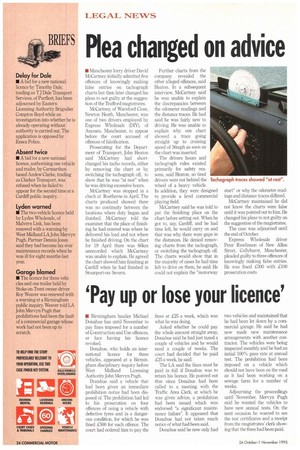Plea changed on advice
Page 26

If you've noticed an error in this article please click here to report it so we can fix it.
• Manchester lorry driver David McCartney initially admitted five offences of knowingly making false entries on tachograph charts but then later changed his pleas to not guilty at the suggestion of the Trafford magistrates.
McCartney, of Warnford Close, Newton Heath, Manchester, was one of two drivers employed by Express Wholesale (DIY), of Ancoats, Manchester, to appear before the court accused of offences of falsification.
Prosecuting for the Department of Transport, John Heaton said McCartney had shortchanged his tacho records, either by removing the chart or by switching the tachograph off, to show that he was "at rest" when he was driving excessive hours.
McCartney was stopped in a check at Rostherne in April. The charts produced showed there was no continuity between the locations where duty began and finished. McCartney told the examiner that the place of finishing he had entered was where he delivered his load and not where he finished driving. On the chart for 19 April there was 66km unrecorded which McCartney was unable to explain. He agreed the chart showed him finishing at Cardiff when he had finished in Stourport-onSevern. Further charts from the company revealed the other alleged offences, said Heaton. In a subsequent interview, McCartney said he was unable to explain the discrepancies between the odometer readings and the distance traces. He had said he was fairly new to driving. He was unable to explain why one chart showed a trace going straight up to cruising speed of 56mph as soon as the chart was inserted.
The drivers hours and tachograph rules existed primarily for safety reasons, said Heaton, so tired drivers were not behind the wheel of a heavy vehicle. In addition, they were designed to provide a level commercial playing field.
McCartney said he was told to put the finishing place on the chart before setting out. When he got to, say, Cardiff, and he had time left, he would carry on and that was why there were gaps in the distances. He denied removing charts from the tachograph, or switching the tachograph off. The charts would show that in the majority of cases he had time left to drive on them, he said. He could not explain the "motorway start" or why the odometer readings and distance traces differed.
McCartney maintained he did not know the charts were false until it was pointed out to him. He changed his pleas to not guilty on the suggestion of the magistrates.
The case was adjourned until the end of October.
Express Wholesale driver Peter Rawlinson of New Allen Street, Collyhurst, Manchester, pleaded guilty to three offences of knowingly making false entries. He was fined 4300 with £100 prosecution costs.












































































































































